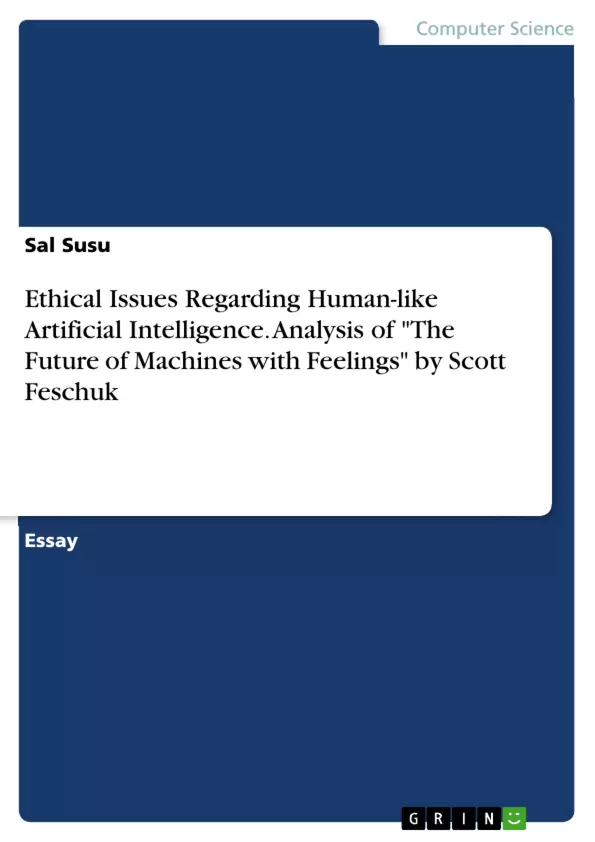This paper will analyse ethical issues regarding human-like Artificial Intelligence by analysing Scott Feschuk’s essay titled “The Future of Machines with Feelings”. The essay provides a humoristic yet disapproving approach towards the future of Artificial Intelligence, stating that the possibility of creating robots that can perceive and use emotions is not far off. They will be able to accurately determine people's emotional states by analysing their facial expressions, and monitor gestures or the inflection in peoples’ voices. Thus, becoming somewhat like an interactive human being.
However, he suggests that such A.I. may not serve society’s interests or enhance it at all. Rather, they will be used to violate people's privacy, and spy on what their owners do in the house, whether eating, reading, or cuddling, and this information will be used by companies who will then send the relevant types of advertisements for them to see. For example, if a phone sees that its owner is sad, it might send them a Kleenex coupon.
Feschuk also suggests that these affective A.I. could be used for even more dangerous acts. He points out that hackers can get all sorts of peoples’ information from the cloud such as credit card information. Furthermore, if such A.I. could listen to people's phone conversations and read their emails, it would facilitate terrorists’ attacks on their enemies. But an important issue that Feschuk fails to address, and perhaps should have mentioned first and foremost, is the possibility of ethical matters that may arise, such as the potential injustice and legal ramifications that come with creating effective A.I., that could foster further problems for humankind.
Inhaltsverzeichnis (Table of Contents)
- The Ethical Issues Regarding Human-Like Artificial Intelligence
- Issues Regarding Equality and Justice
- Conscious Robots
- Ethical Ramifications of A.I.
- The Issue of Different Internal Clocks
- Potential Immortality of Conscious Machines
Zielsetzung und Themenschwerpunkte (Objectives and Key Themes)
This text examines the ethical issues that arise from the creation of human-like artificial intelligence, focusing on the potential consequences of such technology for society and the individual.
- The impact of A.I. on equality and justice
- The nature of consciousness in machines
- The ethical implications of A.I. reproduction and immortality
- The challenges of defining and enforcing laws for A.I.
- The potential for conflict and discrimination between humans and A.I.
Zusammenfassung der Kapitel (Chapter Summaries)
- The Ethical Issues Regarding Human-Like Artificial Intelligence: This chapter introduces the topic by discussing the potential of A.I. to become conscious and experience emotions, raising questions about the ethical implications of such advancements.
- Issues Regarding Equality and Justice: This chapter delves into the potential for A.I. to exacerbate existing social inequalities, arguing that the development of conscious robots may create new forms of discrimination and injustice.
- Conscious Robots: This chapter explores the concept of consciousness in machines, examining the philosophical and scientific challenges of determining whether A.I. can truly be considered conscious beings.
- Ethical Ramifications of A.I.: This chapter examines the ethical implications of A.I. reproduction and immortality, highlighting the potential for conflict and societal upheaval arising from these advancements.
- The Issue of Different Internal Clocks: This chapter explores the potential problems arising from the different internal clocks of humans and A.I., arguing that such differences could lead to challenges in legal and social spheres.
Schlüsselwörter (Keywords)
The text focuses on the ethical issues surrounding the creation of human-like artificial intelligence, exploring concepts such as consciousness, equality, justice, reproduction, immortality, and the legal ramifications of these advancements. The author examines potential consequences for society and individuals, particularly in relation to discrimination, conflict, and the challenges of defining and enforcing laws for A.I.
- Quote paper
- Sal Susu (Author), 2016, Ethical Issues Regarding Human-like Artificial Intelligence. Analysis of "The Future of Machines with Feelings" by Scott Feschuk, Munich, GRIN Verlag, https://www.grin.com/document/1011122



